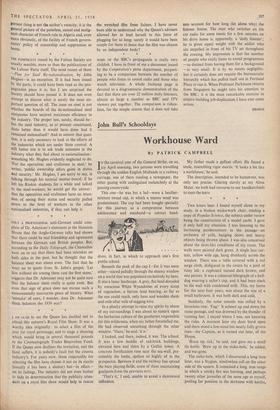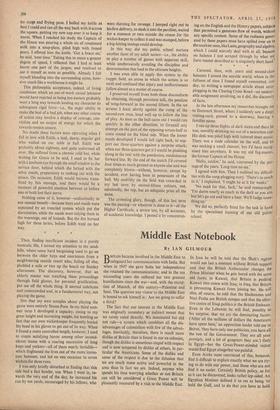John Bull's Schooldays
Workhouse Ward
By PATRICK CAMPBELL
IN the carnival year of the General Strike, on an icy April morning, two persons were travelling through the sodden English Midlands in a railway carriage, one of them reading a newspaper, the other gazing with undisguised melancholy at the passing countryside.
This one—he was but a lad—wore a heather- mixture tweed cap, in which a mauve woof was predominant. The cap had been bought specially for this journey as a compromise between adolescence and manhood—a correct head- dress, in fact, in which to approach one's first public school.
Beneath the peak of the cap I—for it was none other—stared pallidly through the steamy window on a world that was populated exclusively by hens. It was a lunar landscape. A grey, flat land denuded by voracious White Wyandottes of every scrap of vegetation; a barren land bearing, as far as the eye could reach, only hens and wooden sheds and mile after mile of sagging wire.
In a plucky attempt to raise my spirits by abuse of my surroundings I was about to remark upon the barbarian culture of the poulterers responsible for this wilderness, when my father forestalled me. He had observed something through the other window. 'There,' he said, 'it is.'
I looked, and there, indeed, it was. The school. It was a low huddle of red-brick buildings, elevated here and there by a Gothic tower. A concrete fortification rose near the sea-wall, pre- sumably the baths, spoken so highly of in the prospectus. Between it and the railway line spread the bare playing-fields, some of them maintaining goalposts from the previous term 'That's it,' I said, unable to avoid a downward inflection. My father made a gallant effort. He found a smile, resembling rigor mortis. 'It looks a bit like a workhouse,' he said.
The description, intended to be humorous, was only too precise. Glaring sternly at my Alma Mater, we both had recourse to our handkerchiefs to stem the tears.
* * *
Two hours later I found myself alone in my study, in a broken wickerwork chair, reading a copy of Popular Science, the subject under review being the construction of a model yacht. I gave it only half my attention. I was listening to the increasing pandemonium in the passage—an orchestra of yells, banging doors and heavy objects being thrown about. I was also concerned about the slum-like conditions of tny room. The walls were painted dark green. A single lace cur- tain, yellow with age, hung drunkenly across the window. There was a table covered with a red serge cloth, disfigured in the centre by a pool of rusty ink; a cupboard stained dark brown; and one picture. It was a coloured lithograph of a bull- dog wearing a sailor's cap, and it had been stuck to the wall with condensed milk. This, my home for the next four years, was about the size of a small bathroom. It was both dark and cold.
Suddenly, the noise outside was stilled by a• ferocious roar. 'Fag!' It echoed. up and down the stone passage, and was drowned by the thunder of running feet. I stayed where I was, not knowing the rules. A moment later my door burst open and there stood a low-sized but nearly fully grown man—the Captain, as it turned out later, of the House.
'Brace up, tick,' he said, and gave me a small tin kettle. 'Brew up in the stoke-hole,' he added, and was gone.
The stoke-hole, which I discovered a long time later, was a Stygian, windowless cell on the other side of the square. It contained a long, iron range in which a smoky fire was burning, and perhaps twenty other juveniles of the same age as myself, jostling for position in the darkness with kettles, tin mugs and frying pans. I boiled my kettle as best I could and ran all the way back with it across the square, putting my new cap over it to keep it warm. When I reached his study the Captain of the House was pouring a whole tin of condensed milk into a soup-plate, piled high with tinned pears. I offered him the kettle. `Get a brace on,' he said, 'next time.' Taking this to mean a greater degree of speed, I reflected that I had at least learnt one part of the jargon, and resolved to use it myself as soon as possible. Already I felt myself blending into the surrounding scene, how- ever much like a workhouse it might be.
This philosophic acceptance, indeed, of living conditions which an out-of-work casual labourer would have rejected as being too austere probably went a long way towards lending my character its subsequent rigid form—i.e., the eager ability to Make the best of a bad job, when any other course of action may involve a display of courage, con- viction and an output of energy for which the rewards remain unsure.
No doubt these factors were operating when I fell in love with Edith, a lank, damp, angular girl who waited on our table in hall. Edith was 'probably about eighteen, and quite unformed all over. She suffered from a chronic cold but, while waiting for Grace to be said, I used to fix her with a lambent eye through the small window in the service door, behind which she lurked with the other maids, preparatory to rushing out with the mince. On occasion, Edith would become trans- fixed by this message, and there would be a moment of powerful emotion between us before one or both lost their nerve.
Nothing came of it, however—undoubtedly to our mutual benefit—because boys and maids were separated by an ironclad system which put the dormitories, while the maids were tidying them in the mornings, out of bounds. But the fire burned high for three terms, before Edith went on her way.
Then, finding insufficient incident in a purely monastic life, I turned my attention to the sand- hills, where some hard bargaining used to go on between the older boys and courtesans from a neighbouring seaside resort who, failing all else, plodded a mile or two up the beach on Sunday afternoons. The discovery, however, that an elderly master was watching these proceedings through field glasses, for personal gratification, put me off the whole thing. It seemed indelicate and overcrowded and, in a fundamental way, not playing the game.
Not that my own scruples about playing the game were entirely Simon Pure. In my third sum- mer term I developed a capacity, owing to my great height and increasing weight, for bowling so fast that our own wicketkeeper frequently buried his head in his gloves to get out of its way. When I found a more controlled length, however, I used to create satisfying havoc among other second- eleven teams with a roaring succession of long hops and yorkers—all of them nearly invisible— which frightened the lives out of the more imma- ture batsmen, and led on one occasion to seven wickets for three runs.
I was only briefly disturbed at finding that this side had a fast bowler, too. When I went in, to- wards the very end of the day, he increased his run by ten yards, encouraged by his fellows, who were thirsting for revenge. I jumped right out to his first delivery, to slash it into the pavilion, waited for a moment or two outside the crease for the wicket-keeper to collect it and was stumped, before a big-hitting innings could develop.
In this way did my public school nurture another facet of my adult nature—i.e., the ability to play a number of games with apparent skill, while unobtrusively avoiding the discipline and determination that lead to the ultimate heights.
I was even able to apply this system to the rugger field, an arena in which the action is so swift and confused that injury and ineffectiveness follow almost as a matter of course.
I preserved myself from both 'these discomforts by obtaining, through persistent talk, the position of wing-forward in the second fifteen. In the set scrums 1 leant alertly against the rump of the second-row man, head well. up to follow the line of play. As soon as the ball came out I would run quickly in the other direction, to forestall any attempt on the part of the opposing scrum-half to come round on the blind side. When the looser mauls developed I would fall right back, to sup- port our three-quarters against a surprise attack; when our three-quarters got it I would be plodding along in the rear with the ponderous, outdistanced forward line. By the end of the match I'd covered four times as much ground as anyone else and was completely blown—without, however, except by accident, ever baying been in possession of the ball. My mobility on the field was rewarded in my last term by second-fifteen colours, not, admittedly, the top, but an adequate prize all the same.
The crowning glory, though, of this last term was the passing—or whatever is done to it—of the Higher Certificate, a severe test, by all accounts, of academic knowledge. I passed it by concentrat- ing on the English and the History papers, subjects that permitted a generous flow of words, without any specific content. Some of the radiance gener- ated by these papers must have spilled over on to the murkier ones, like Latin, geography and algebra, which I could scarcely deal with at all, because on balance I just scraped through by what my form master described as 'a singularly short head.'
Covered, then, with years and second-class honours I joined the outside world, where in the fullness of time I found myself committed, one day, to writing a newspaper article about song- plugging in the Charing Cross Road—an undesir- able assignment involving, as it did, the discovery of facts.
In the late afternoon my researches brought me to Denmark Street, where I suddenly saw a dingy visiting-card, pinned to a doorway, bearing familiar name.
I ran up three flights of dark stairs and there he was, moodily drinking tea out of a saucerless cup. His desk was piled high with tattered sheet music. There was a nude calendar on the wall, and he was sucking a small cheroot, but I'd have recog- nised him anywhere. It was my old fag-master, the former Captain of the House.
`Hello, cocker,' he said, coarsened by the pas- sage of the years. 'Long time no see.'
I agreed with him. Then I outlined my difficul- ties with the song-plugging story. 'There's so much in it,' I explained. 'I might be at it for weeks.' `No need for that, Jack,' he said reassuringly. `I'm damn nearly as much in the dark as you are, but let's go out and have a beer. We'll fudge some- thing up.' We did so, perfectly fitted for the task in hand by the specialised training of our old public school.















































 Previous page
Previous page